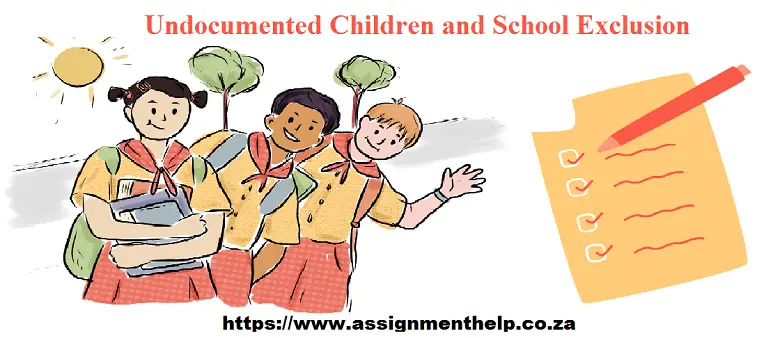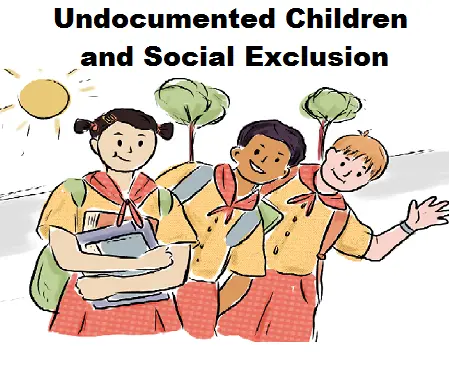
The Struggle for Undocumented Children’s Right to Education in South Africa
The educational system creates barriers which prevent individuals from accessing quality education based on their identity as financially disadvantaged or medically challenged or legally restricted groups. Some learners face educational system marginalization because they end up at its extreme points when their situations include disability alongside poverty and undocumented status. The promise of basic education standards through the constitution remains unfulfilled to many undocumented children in South Africa because they lack birth certificates and legal residency documents.
The Ntisa article “Outrage as Undocumented Children Enrolled in Schools Sparks National Debate” explains how undocumented students entering educational institutions triggered massive public debate throughout the nation. During the school admission situation different interests clashed about who deserved both educational access and constitutional rights to education. The research investigates exclusion impacts on undocumented students in South Africa followed by evaluations of existing policies regarding educational admission before recommending approaches to promote educational inclusivity.
Contextual Background of the Article
Ntisa wrote an article in January of 2025 in Gauteng News which dealt with the national controversy regarding allowing illegal children to study at South African state schools. Provincial education departments took the decision for illegal children whose parents are either foreign or undocumented to be accepted in schools in the region. The choice to admit unauthorized students encountered vehement opposition from public personalities and the advocates of severe immigration policies due to the added challenges that resource-deprived educational institutions would encounter.
Different individuals blamed the action for defying immigration laws and undermining the already existing human rights safeguards of indigenous citizens. The Department of Basic Education defended this policy by invoking the constitutional guarantee of basic education, while political parties with school governing body members called for clearer guidelines on how to enforce it. Civil society organizations welcomed the decision as a win for child rights protections.
On this matter, South African society has particular reason to care Why? Basic education rights for all South Africans are enshrined in Section 29 of the Constitution, but undocumented children are facing ongoing barriers to implementation. The case exposes the conflict between adhering to legal admission procedures and implementing administrative policies as educators strive to create education practices that meet the rights of every student regardless of their legal status.
Understanding the Exclusion of Undocumented Children
The shortage of essential official paperwork such as birth certificates and immigration permit functions as a major disability preventing children from accessing formal education in South Africa. Everyone is protected under South African laws through the Constitution of the Republic of South Africa but undocumented children face practical and administrative barriers to education. Strong inclusivity policies have no effect on the exclusion of students from schools because they do not possess essential documents. Through their strict duty performance administrators create discrepancies between constitutional principles and actual life practice (Nevondwe and Odeku, 2013).
The enrolment of undocumented learners involves major administrative hurdles along with social and emotional harm to their well-being. Undocumented students face unworthiness alongside fear and shame as a result of disrespectful treatment combined with discrimination. Children who feel different experience long-term trauma during this period when their self-confidence disappears. When undocumented students join classrooms, they often encounter discrimination alongside prohibited school activities and examination participation at both academic levels. Such events lead these students to face increasing levels of social isolation.
The educational process excludes undocumented children due to inconsistent school practices that limit interpretation skills and inadequate teacher guidance about inclusive education along with ambiguous government guidance. The White Paper 6 together with SIAS policy endorse school inclusion yet multiple associated school procedures fail to explicitly handle undocumented children. Undocumented children encounter different major life difficulties beyond dealing with their documentation problems.
Multiple undocumented students experience life challenges due to their family’s lack of adequate income alongside food shortages and unstable living environment. Disabilities emerging from external variables like income levels create atmosphere for educational discrimination which results in progressive poverty cycles. Xenophobic hostility apparent or latent converts schools into dangerous places as much as spaces that are unwelcoming to immigrants. Social integration and psychological health of the illegal students are truncated due to the stigma that derives from their undocumented status in communities.
Mental health illnesses are more prevalent in excluded children who present symptoms of anxiety and depression. Unregistered learners become more vulnerable than other students since they are deprived of academic and emotional support. Overcoming their exclusion requires us to identify the double barriers they face and we should act permanently to eliminate all the barriers which hinder their education rights.
Relevant Policies, Frameworks and Legal Instruments
Every child under South African jurisdiction possesses legal rights to schooling according to the robust local legislative system. According to section 29(1)(a) of the Constitution all people possess an unqualified right to basic education irrespective of their citizenship or documentation status. Similarly, the South African Schools Act 84 of 1996 mandates compulsory attendance for all children between the ages of 7 and 15. Implementations across South African society fail to match the inclusive policies that exist through law.
Schools still request identity documents or birth certificates from new students which prevents undocumented children from attending school despite the laws and the Constitution. Implementation practices in South Africa contradict the country’s support for international agreements due to differences between policy mandates and actual school enrolment procedures. The Salamanca Statement asserts that educational institutions must serve all children including those with physical disabilities as well as emotional challenges and linguistic differences and those lacking a legal status (UNESCO, 1994).
According to the Dakar Framework for Action any group subject to exclusion need their barriers to education eliminated including marginalized people whose circumstances lead to displacement or poverty (UNESCO, 2000). South Africa hasn’t reached the inclusivity standards outlined in international documentation although these standards emphasize taking active steps for inclusion.
The current inclusive education policies across the nation seem inadequate in their current form. Ultimately the Education White Paper 6 (Department of Education, 2001) set forth an inclusive education blueprint though implementation faced lots of obstacles and poor funding support. The SIAS policy operated by the Department of Basic Education during 2014 aims to help learners overcome barriers in learning yet it lacks proper protocols to assist undocumented children. Because of this insufficient assessment method, they receive no support nor evaluation.
Progressive laws together with policy frameworks do not protect undocumented learners from marginalization. The disconnect between policy expectations and school operation allows numerous children to pass through a gap which denies them basic human rights guaranteed within South African and international law.
Recommendations for Inclusion
There are evidence-informed practical steps that must be taken to rectify the plight of undocumented children being excluded from South African schools. Now, a policy shift from the Department of Basic Education must require written documentation of school admission like affidavits by the guardian or community leader. That said, removing administrative things would mean that documentation status could no longer be an access point to education.
Implementation of White Paper 6 and SIAS policy demands greater focus by schools for effective implementation. These initiatives should set up training schemes for school principals and admission officers to effectively comprehend and apply these policies and adhere to both the Constitution as well as South Africa’s global obligations. Schools must also have systems in place for routine monitoring and enforcement of these interventions.
The establishment of training all school personnel, from teacher to administrative staff, regarding children’s rights along with diversity education and trauma-sensitive teaching methods must be made. In turn, a supportive teacher can support a positive community where empathy serves either the academic needs of undocumented students or their psychological welfare. Vital too is collaboration with non-governmental organisations, community groups and legal aid clinics. Stakeholders support each other to help them with legal documentation while keeping their mental health in check and work hard for children education.
Education is acknowledged as a fundamental human right that cannot limit the accessibility due to lack of documents. You are asking to be discriminated against and excluded from schools based on paperwork documentation — and that goes against the national principles for equality and a human picture. Establishment of inclusive education practices should be both a requirement of policy and encore of social institutions.
Conclusion
School exclusions of undocumented children violate their constitutionally guaranteed rights andunmount the dignity with which they should be treated. The inclusion of undocumented students needs open policies that must be backed by dedicated practitioners who work together with communities for successful execution. The constitution grants children the right to education thus educational institutions and administrative bodies must implement changes that offer protection to all children including those without legal documentation.


 Top South African Management Writers
Top South African Management Writers